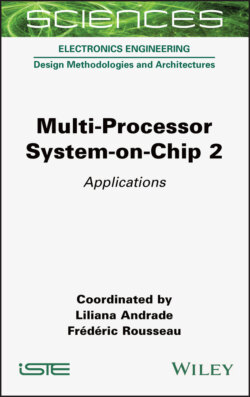Читать книгу Multi-Processor System-on-Chip 2 - Liliana Andrade - Страница 21
1.2.2.3. Specification summary
ОглавлениеWe can now combine both the latency and data throughput requirement into low- and high-end corners on the 2D plane. Low-end use case is clear: LTE legacy 1.4 MHz. High-end, however, has two options: either the highest data of μ = 3, BW = 400 MHz or the shortest deadline μ = 4. We chose the former as the combined high-end due to nonlinear scaling of operations per data point in algorithms. For example, to compute the 4096 inverse discrete Fourier transform (IDFT) used in μ = 3, BW = 400 MHz for a single OFDM symbol, it takes more operations than to compute 2 × 2048 IDFT for two symbols used in μ = 4, BW = 400 MHz, i.e. over the same duration, there are more operations in μ = 3, BW = 400 MHz. The corner cases are presented in Table 1.1, with expression of throughput in other units as well, for a more reader-friendly overview.
Table 1.1. Processing requirement corners as per standard specification
| Use Case | Throughput | TTI | ||||
| [μs] | ||||||
| Low-end LTE legacy (3GPP 2019a, b) | 72 | 6 | 6 | 6 | 0.2 m | 1,000 |
| CA high-end FR2 (3GPP 2019d, f) 4×CA, µ = 3,400MHz | 3,168 | 264 | 1,056 | 8,448 | 10.52 | 125 |
| MIMO CA high-end FR2 (3GPP 2019d, e, f)8×8, 4×CA, µ = 3,400MHz | 3,168 | 264 | 8,448 | 67,584 | 84.16 | 125 |
